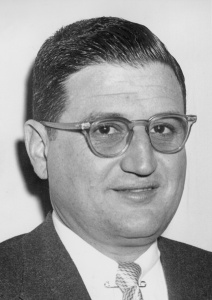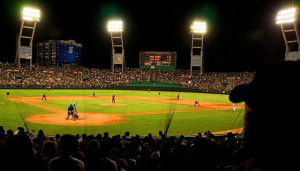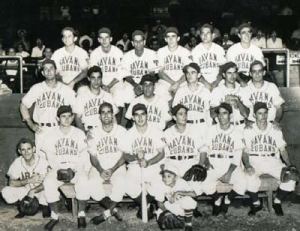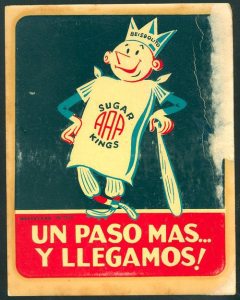 Roberto ” Bobby” Maduro de Lima was born on June 27, 1916, in Havana.
Roberto ” Bobby” Maduro de Lima was born on June 27, 1916, in Havana.
Maduro was one of the biggest promoters had the Cuban professional baseball during the decade of the forties and fifties of the last century. This businessman was linked to several unforgettable moments of national ball as the construction of the Grand Stadium del Cerro, in 1946, and the formation of the Cuban Sugar Kings who played in the Class AAA International League.
His family, of Jewish origin, had various businesses, from sugar production to the property of a bus line. This allowed Bobby to study in the US, first to complete the high school, in North Carolina, and then in 1934, he entered Cornell University in engineering education; but failed to finish. .
Maduro, as with most young wealthy families, enrolled in one of the most aristocratic clubs, Vedado Tennis Club. There he played amateur baseball team as a first baseman “Marquis of Vedado.”
However, the legacy of the Cuban baseball Maduro was not as a player but as an entrepreneur. His family money along to their friends Miguelito Suárez and Emilio de Armas was behind the corporation that financed the construction of a new, modern facility: Grand Stadium del Cerro, a project completed in October 1946 and cost nearly 2 million pesos, a figure that represented a huge fortune for that time.
Maduro’s interest by businesses associated with baseball led him to become, before the start of the 1949-1950 season, co-owner of Cienfuegos, with Emilio de Armas and friend Luis Parga, who owned company selling sports products, known as “Casa Tarin”.
The business continued to grow and in May 1953, Maduro became the majority owner of the Havana Cubans, a team participating in the International League in Florida. For this operation Maduro paid $ 40,000 to Clark Griffith, owner of the Washington Senators in the majors; But Bobby had bigger aspirations and his next step was even bolder: he managed economic control over a team that participated in the Class AAA International League and then moved to Havana. Thus were born the Cuban Sugar Kings.
The idea of Maduro, placing in Havana to a AAA franchise, was in a not so distant future, perhaps, make the selection in a Major League club. The slogan used by the Cuban Sugar Kings perfectly illustrates this scheme: “One more step and we”.
The influence and logically enabled Maduro money in 1954, travel to Havana for the Yomiuri Giants, the first Japanese team that came to Cuba. By that date, Maduro sold to Cienfuegos, probably with the aim of concentrating all their efforts on developing the Sugar Kings.
In August 1954 an agreement between the Sugar Kings and the Cincinnati Reds of the National League materialized. In this way, the Kings almost became a branch of the Reds. In addition, the agreement also opened the door for several Cuban players militate, in the following years, the ranks of Cincinnati.
The most memorable for the Cuban Sugar Kings point came in 1959. A year earlier, the team finished in last place in the league, but the following season took third place, with a record 73 wins and 80 failures. In the first playoff beat Columbus and then to Richmond, so he won the right to dispute the Little World Series, against the Minneapolis Millers.
The Little World Series was great and ended with the victory of the Sugar Kings, in bottom of the ninth inning of the seventh game, developed in the Great Stadium del Cerro. The victory sparked a big celebration in the capital, for although the team were active several US players, Cuban fans felt it as a local selection.
The history of the Sugar Kings did not end in the best way. On July 8, 1960, Maduro said his decision to keep the team in Havana, but officials of the International League had another idea, at a time when he had climbed the offensive tone and actions of Washington on the revolutionary government.
On July 9, the International League, through its president, Frank Shaughnessy announced the Sugar Kings move to Jersey City, supposedly to “protect the players.” According to Maduro, this was a big mistake, because baseball established a strong link between the two peoples.
Mature settled permanently in the United States in 1961. There he remained linked to baseball, as owner of the Jacksonville Suns, who also played in the International League and then as Director of the Office of Inter-American Relations in the majors, where he worked as “liaison between Latin American and US professional leagues organized baseball.”
In October 1986, shortly after his 70th birthday, an inoperable brain tumor ended the life of a man who, by Abel Linares, can be considered one of the most recognized businessmen in the history of Cuban baseball.
The National Baseball Hall of Fame considered 10 Executives and Pioneers for induction in 2010. Bobby Maduro was not among the men on the Veterans Committee’s ballot. Yet at the very least, his accomplishments merit the Screening Committee’s attention for Cooperstown’s Class of 2012.
In 2005, Bobby Maduro Jr. said of his father, “He was a national treasure in Cuba. He loved baseball. He loved el cubanismo.”109 Along with all of the wonderful Cuban players over the years, Roberto Maduro de Lima helped weave baseball tightly into his homeland’s fabric. Yet few if any men in the game’s history have had such a broad worldview.
Agencies/HabanaR./various/Excerpts/M.E.Gómez Masjuán/InternetPhotos.
The Cuban History, Hollywood.
Arnoldo Varona, Editor





